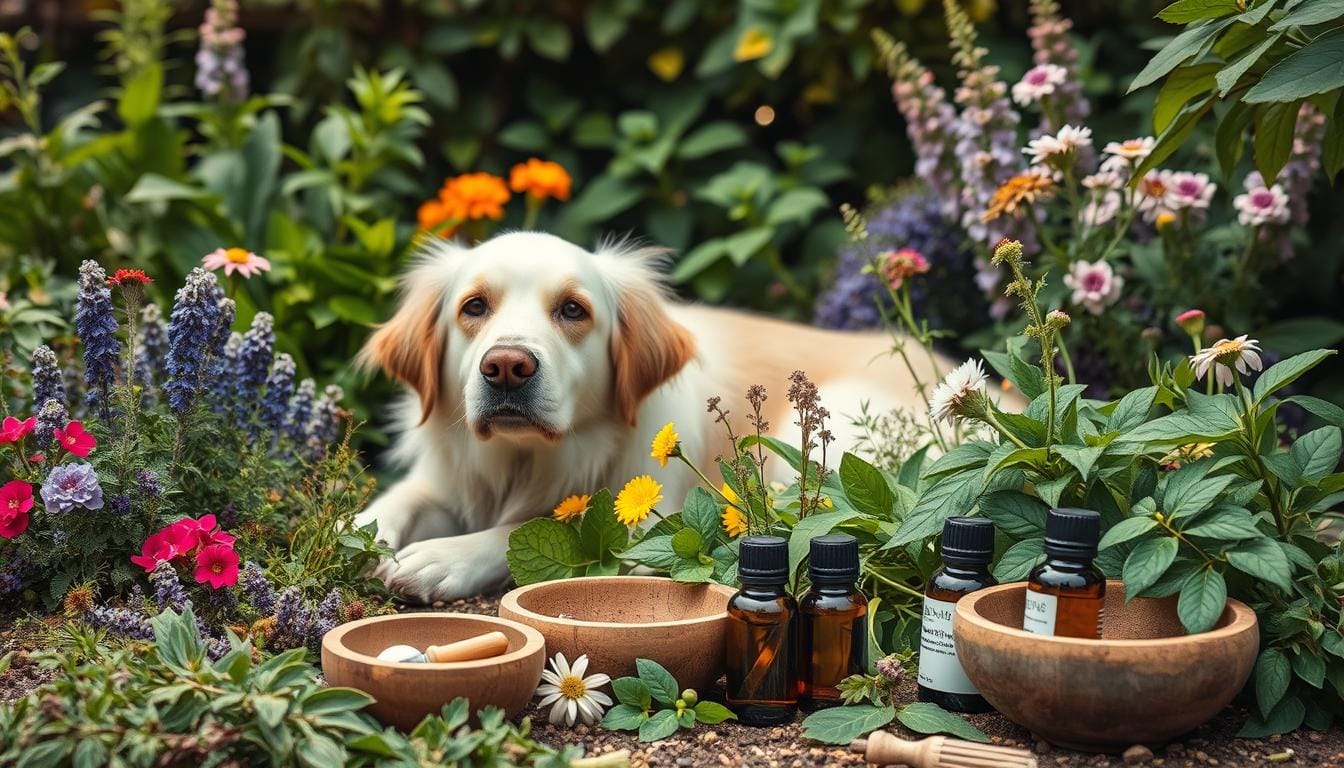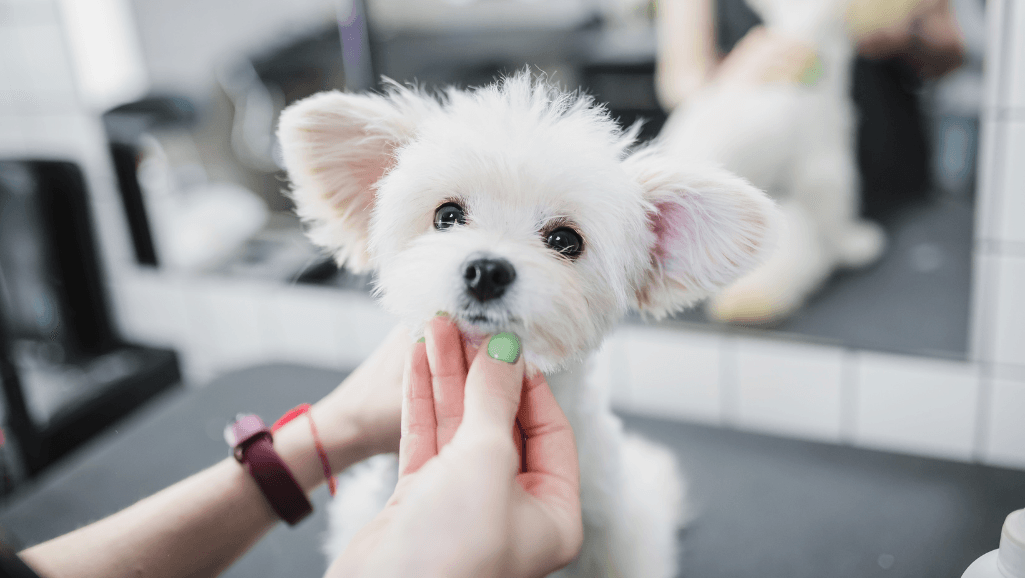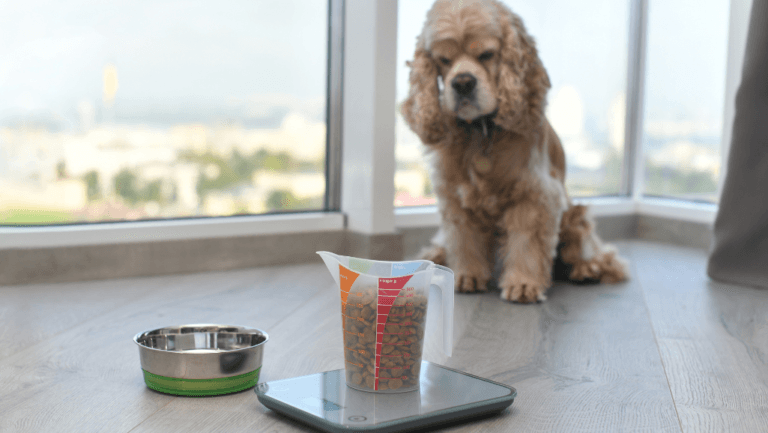Seeing your pet suffer from allergies can be very sad. Allergies can make their skin itchy, eyes watery, and stomach upset. Luckily, there are natural ways to help your dog feel better.
Using organic and plant-based remedies can be a safe and effective way to help your dog. Ingredients like apple cider vinegar, vitamin E, and fish oils can help. So can oatmeal, yogurt, and coconut oil. Even spirulina and kelp powder can help with allergies.
Most dog allergies come from the environment, not food. Pollen, dust mites, and fleas are common culprits. Signs of allergies include itching, inflamed skin, and sneezing.
Managing dog allergies requires a few steps. This includes changing their environment, using topical treatments, and trying home remedies. Methods like air purifiers, oatmeal baths, and probiotics can help. So can coconut oil, vitamin E, and fish oil.
Key Takeaways:
- Natural Remedies for Dog Allergies.
- Natural remedies offer a safer alternative to conventional treatments for dog allergies
- Environmental allergies are more common in dogs than food allergies
- Identifying allergen triggers is key for effective allergy management
- Holistic approaches combine lifestyle changes, topical treatments, and home remedies
- Organic allergy solutions can provide relief without the side effects of medications
Understanding Dog Allergies and Their Symptoms
As a dog owner, knowing the signs of allergies is key. Allergies can make your dog uncomfortable and affect their happiness. Learning about common allergy signs and allergens helps you help your dog feel better.
Common Signs of Allergies in Dogs
Dogs with allergies may show several symptoms. These include:
- Itchy skin and excessive scratching
- Hot spots or skin irritation
- Anal gland issues
- Ear problems, such as itching or infection
- Digestive issues and chronic diarrhea
If you see these signs in your dog, it’s important to act fast. A vet can help figure out what’s wrong and how to treat it.
Types of Allergens Affecting Dogs
Dogs can react to many things, like pollen and dust mites. These can make their skin itch and their eyes run. Food allergies are less common but can also cause problems.
According to the AKC, food allergies in dogs can result in immune responses ranging from hives to gastrointestinal symptoms.
Finding out what’s causing your dog’s allergy is key. Your vet might suggest tests or a special diet to find and treat the problem.
When to Consult a Veterinarian
While home remedies for dog allergy relief can help, see a vet for serious symptoms. Severe itching, ear infections, or digestive problems need a vet’s help. They can check your dog, rule out other health issues, and suggest treatments.
Allergy tests might be needed to find out what’s causing your dog’s allergies. With your vet’s help, you can make changes to your dog’s diet and environment. This way, your dog can feel better and live a happier life.
Dietary Changes for Allergy Relief
Managing dog allergies can be helped by changing their diet. Adding natural immunity boosters can make your dog feel better and lessen symptoms.
One big mistake in treating dog food allergies is not giving enough time for an elimination diet trial. This usually takes two to three months. It’s important to remove possible allergens like beef, chicken, lamb, wheat, soy, eggs, corn, and nuts from their food.
Incorporating Antioxidant-Rich Foods
Antioxidant-rich foods are key in fighting inflammation and boosting your dog’s immune system. Adding broccoli and apples to their diet can help fight allergies. These foods are full of vitamins and minerals that keep your dog healthy.
Benefits of Omega-3 Fatty Acids
Omega-3 fatty acids, found in fish oil and cold-water fish, calm the skin and lessen allergic reactions. These fats keep the coat and skin healthy, reducing itching and irritation. Adding a good fish oil supplement or feeding them fish like salmon can help.
“Consistency in incorporating these superfoods into the dog’s daily routine is key to seeing the best results.” – Holistic Veterinarian
The Role of a Grain-Free Diet
For some dogs, a grain-free diet can help with allergies. Grains can make allergies worse, causing digestive problems and skin issues. Switching to a grain-free diet with novel proteins like duck, fish, venison, or kangaroo can help.
Always talk to your vet before changing your dog’s diet. They can help pick the best food for your dog and watch how they do with new foods.
Herbal Remedies for Dog Allergies
Many pet owners are looking for natural ways to help their dogs with allergies. Herbal treatments are becoming more popular. They offer a gentle way to soothe itchy skin, reduce inflammation, and boost the immune system. Let’s look at some effective herbal options for your furry friend.
Chamomile: Calming Properties
Chamomile is great for calming dogs with allergies. You can make a strong chamomile tea, cool it down, and use it on your dog’s skin. It helps with itching and inflammation. Plus, its scent can relax your dog.
Neem Oil for Skin Irritation
Neem oil comes from the neem tree and has been used for centuries. It soothes skin irritation and reduces inflammation from allergies. It also fights bacteria and fungi. But, always dilute it with a carrier oil and talk to your vet before using it.
Oatmeal Baths for Soothing
Oatmeal baths are a classic remedy for itchy skin in dogs and humans. Oatmeal has anti-inflammatory and antihistamine compounds. To make an oatmeal bath, grind oatmeal into powder and mix it with warm water. Let your dog soak for 10-15 minutes, then rinse and dry.
“Herbal remedies offer a natural and gentle approach to managing dog allergies, providing relief without the potential side effects of conventional medications.”
Other herbs like licorice and nettles also help with dog allergies. Licorice root fights inflammation, and nettles have natural antihistamines. Always talk to a holistic vet before using herbal remedies to make sure they’re safe and won’t interact with other medicines.
Homeopathic Treatments for Dogs
Homeopathy treats dog allergies by using natural substances in small amounts. It helps the body heal itself. This method aims to boost the pet’s energy and immune system, reducing allergy reactions. With over 4,000 remedies, finding the right one for your dog needs a trained homeopath.
Key Principles of Homeopathy
Homeopathy’s main idea is “like cures like.” A substance causing symptoms in large amounts can cure them in small amounts. These remedies are made from natural stuff and are so diluted, they can’t harm your pet. The goal is to fix imbalances in the body to get rid of symptoms and improve overall health.
Common Homeopathic Remedies
Some effective homeopathic medicines for pet allergies include:
- Allium Cepa: For runny nose and watery eyes
- Euphrasia Officinalis: For itchy, irritated eyes and nasal discharge
- Arsenicum Album: For animals seeking heat, fearful, with diarrhea, skin problems, and respiratory issues
- Apis Mellifica: For swelling, hives, and itching
- Sulphur: For chronic skin issues and general itchiness
Consulting a Homeopath
Choosing a homeopathic remedy for your dog’s allergies needs a trained homeopath. They consider your pet’s symptoms, personality, and health to find the best remedy. Homeopathic treatment is tailored, so what works for one dog might not work for another. A homeopath can also guide on the right dosage and how often to give it to your dog.
Health in homeopathy is defined as a state of well-being and vitality, not just the absence of symptoms.
Importance of Regular Grooming
Regular grooming is key for managing dog allergies without medicine. It keeps their coat clean and healthy. It also reduces allergens that can cause reactions in dogs and people. By grooming your dog regularly, you can lessen the effects of allergies on their health.
Bathing Frequency for Allergic Dogs
Bathing is important for removing allergens from your dog’s skin and coat. But, bathing too much can dry out their skin. For allergic dogs, use a gentle shampoo, like oatmeal-based ones. Talk to your vet to find the right bathing schedule for your dog.
Benefits of Brushing and De-shedding
Brushing and de-shedding are vital for managing dog allergies. They remove loose fur and dander, which can carry allergens. This makes your home a safer space for your dog and family. Brush your dog often, focusing on areas that tend to mat or tangle.
“Brushing your pet daily can reduce loose fur and dander, making your home more allergy-friendly.”
Reducing Allergens in the Home Environment
Reducing allergens in your dog’s space is also important. Clean their bedding, vacuum carpets and upholstery, and use air purifiers. This helps keep your home allergen-free, making it more comfortable for your dog.
Remember, grooming is just one part of managing dog allergies. It should be combined with diet changes and other environmental steps. A complete approach can help your dog feel better and live a happier life.
Environmental Management Techniques
Managing your dog’s environment is key to using natural remedies for dog allergies. By reducing allergens at home, you can help your dog feel better. Let’s look at some ways to make your home allergen-free.
Creating an Allergen-Free Living Space
To start, make your home clean and hypoallergenic. Vacuuming with a HEPA filter can remove dust, pollen, and pet dander. Use allergy-friendly bedding for your dog, like washable covers and hypoallergenic materials.
Also, limit your dog’s outdoor time when pollen is high. Clean your dog’s paws and fur after walks to remove allergens. These simple steps can lower allergen levels in your home.
Using Air Purifiers Effectively
Air purifiers with HEPA filters are great for removing airborne allergens. They can catch particles as small as 0.3 microns, including pet dander and pollen. Put air purifiers in areas where your dog spends most of their time, like the living room and bedroom.
To get the most out of air purifiers, change the filters as recommended. Clean air in your home makes it more comfortable for your allergic dog.
Seasonal Allergy Awareness
Dogs with environmental allergies often get worse in spring and fall. Knowing when pollen is high can help you prevent your dog’s discomfort.
According to the Asthma and Allergy Foundation of America, 15 to 30 percent of all Americans are affected by pet allergies.
In high-allergy seasons, limit your dog’s outdoor time. Give them a soothing oatmeal bath to ease itchy skin. By being proactive and adjusting to seasonal changes, you can help your dog manage their allergies better.
Natural Antihistamines for Dogs
Looking for home remedies for dog allergy relief? Natural antihistamines can be a big help. They stop histamine, which causes itching, swelling, and inflammation. Adding natural antihistamines to your dog’s diet can safely ease their allergy symptoms.
Quercetin: The Natural Antihistamine
Quercetin is a powerful natural antihistamine found in fruits and veggies. It’s great for fighting inflammation and is a strong antioxidant. Dogs can take quercetin supplements, but always check with your vet first.
Choose quercetin supplements without additives or sweeteners. Some products include bromelain, which boosts quercetin’s effects. Always talk to your vet before starting any new supplements.
Vitamin C and Allergy Relief
Vitamin C is also a natural antihistamine that helps dogs with allergies. It boosts the immune system and fights histamine. Adding vitamin C-rich foods or supplements can help reduce symptoms and improve health.
The Benefits of Butterbur
Butterbur is an herb that might help with allergies in dogs. It works by stopping histamine release and reducing inflammation. While more studies are needed, it could be a good option with your vet’s advice.
When looking into natural antihistamines for your dog, work with your vet. They can help create a plan that fits your dog’s needs. With natural remedies, good food, and regular vet visits, your dog can live a happier life.
Probiotics for a Healthy Immune System
Supporting your dog’s immune system is key when managing allergies. Probiotics are a great way to boost their natural immunity. They are beneficial bacteria that help keep the gut healthy, which is important for the immune system.
Studies show that allergic dogs have different gut bacteria than healthy ones. This means their gut flora is not balanced. Adding probiotics can help fix this imbalance and improve allergy symptoms.
The Connection Between Gut Health and Allergies
An imbalanced gut can make allergies worse. When the gut is not healthy, it can lead to more inflammation and a weaker immune system. Probiotics help by making the gut environment better, which can reduce allergic reactions.
A study by Xu et al. in 2019 found probiotics improved immune markers in dogs. This includes higher levels of certain antibodies and lower inflammation. These findings show that probiotics can help manage allergies in dogs.
Best Probiotic Supplements for Dogs
When picking a probiotic for your dog, look for high Colony Forming Units (CFU). This means the supplement is strong and effective. Good strains for dogs include Lactobacillus and Bifidobacterium, which support gut health and immunity.
Honest Paws’ Well Pre+Probiotics is a popular choice. It has both prebiotics and live probiotics. It’s great for digestive health and boosting the immune system, making it perfect for dogs with allergies. It comes in 85 soft chews, with feeding instructions based on your dog’s weight.
Incorporating Probiotics into a Diet
You can also add probiotic-rich foods to your dog’s diet. Good sources include:
- Plain yogurt or kefir (1-4 teaspoons daily, depending on the dog’s size)
- Sauerkraut (1 tablespoon per 20 pounds of body weight a day)
- Pumpkin (1-4 tablespoons per meal, depending on size)
- Cottage cheese (3 ounces for a 25-pound dog)
- Fermented vegetables (start with 1/2-1 teaspoon, gradually increasing the amount)
Start with small amounts of new foods and watch for any side effects. Some dogs might get digestive issues or itching from probiotics. Always be careful and adjust as needed.
Probiotics can greatly help your dog manage allergies and improve their health. Always talk to your vet to find the best probiotics for your dog.
Adding natural immunity boosters for allergic dogs like probiotics can really help. With the right approach, your dog can live a happier, healthier life.
Essential Oils for Allergy Relief
Essential oils have been used for centuries to promote health and well-being. They can be a valuable addition to a holistic allergy care plan for canines. These concentrated plant extracts contain powerful compounds that can help alleviate allergy symptoms and support overall health.
Many essential oils contain terpenes, which aid in kidney and liver detoxification. Oils with caryophyllene have anti-inflammatory properties that can help reduce allergy symptoms. But, it’s important to note that producing just 16 ounces of quality essential oil may require thousands of pounds of plant material.
Safe Essential Oils for Dogs
When using essential oils for your dog’s allergy relief, it’s important to choose oils that are safe and effective. Some of the best options include:
- Lavender: Analgesic, anti-fungal, and antihistamine properties, making it effective for skin allergies, itching, and sleep.
- Chamomile: Calming and soothing properties that can help reduce inflammation and skin irritation.
- Frankincense: Anti-inflammatory and immune-boosting properties that can help manage allergy symptoms.
“Essential oils are natural antihistamines that can help alleviate allergy symptoms in dogs when used properly.”
Methods of Application
When using essential oils for your dog’s allergy relief, it’s important to use therapeutic-grade oils from reputable companies to avoid contaminants. The most common methods of application include:
- Diffusing: Adding a few drops of essential oil to a diffuser can help purify the air and provide respiratory relief.
- Topical use: Dilute one drop of essential oil in 50 drops of a carrier oil, such as coconut oil, and apply to your dog’s skin or paw pads.
- Bath water: Add a few drops of essential oil to your dog’s bathwater for a soothing and therapeutic experience.
Precautions When Using Essential Oils
While essential oils can be beneficial for holistic allergy care in canines, it’s important to use them with caution. Some key precautions include:
- Never apply essential oils directly to your dog’s coat, and prevent ingestion or skin contact.
- Avoid using essential oils continuously for more than two weeks to prevent sensitivity and organ toxicity.
- Be aware that some essential oils, such as tea tree, cinnamon, and citrus, can be toxic to dogs.
- If you suspect essential oil poisoning, contact your veterinarian and the Pet Poison Helpline immediately.
By incorporating safe and effective essential oils into your dog’s holistic allergy care plan, you can help provide natural relief from symptoms and support their overall health and well-being. Always consult with a veterinarian before using essential oils to ensure the best possible care for your furry friend.
Monitoring and Adjusting Treatments
When using organic allergy solutions for pets, it’s key to watch how your dog reacts. This helps you tweak the treatments to make them work best. Keeping a journal of your dog’s symptoms and how treatments help can guide your care.
Keeping a Journal of Symptoms and Treatments
Start a daily journal to track your dog’s allergies and how treatments are going. Write down any signs like itching or red skin. Also, note what might be causing these issues, like certain foods or the weather.
Record the natural remedies you’re trying, including how much and how often. This will help you see what works and what doesn’t.
When to Change Natural Remedies
If a remedy isn’t helping your dog’s allergies, it’s time to look for something else. Your journal will show which treatments have been best. Always talk to your vet before switching to make sure it’s safe for your dog.
Understanding Long-Term Management of Allergies
Managing your dog’s allergies takes time and a mix of strategies. Try changing their diet and keeping their environment clean. Natural treatments can also help without the usual side effects of medicines.
Work with a holistic vet and use your journal to create a plan that fits your dog’s needs. This way, your dog can live comfortably, free from allergies.





















